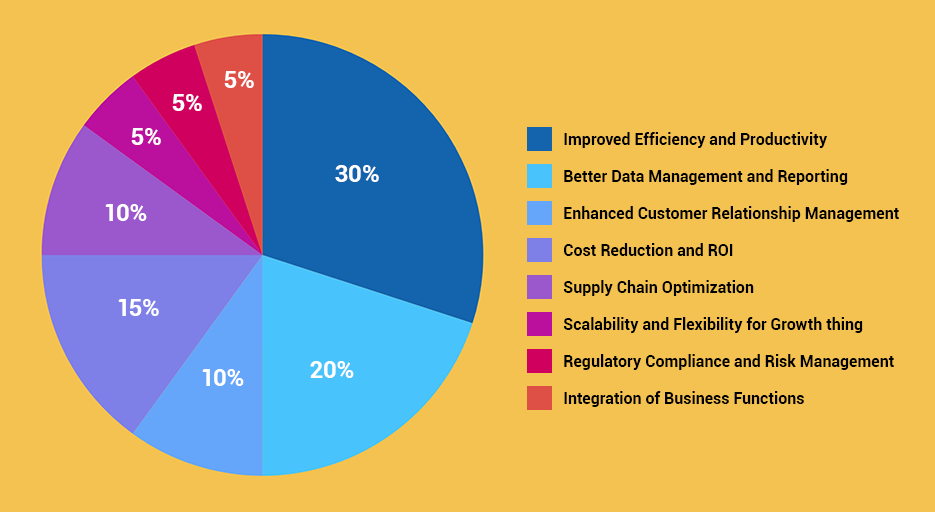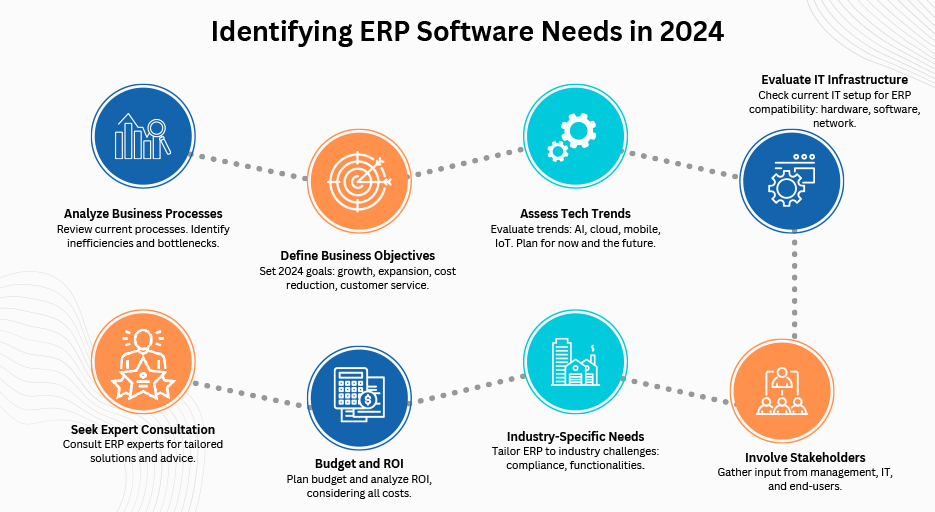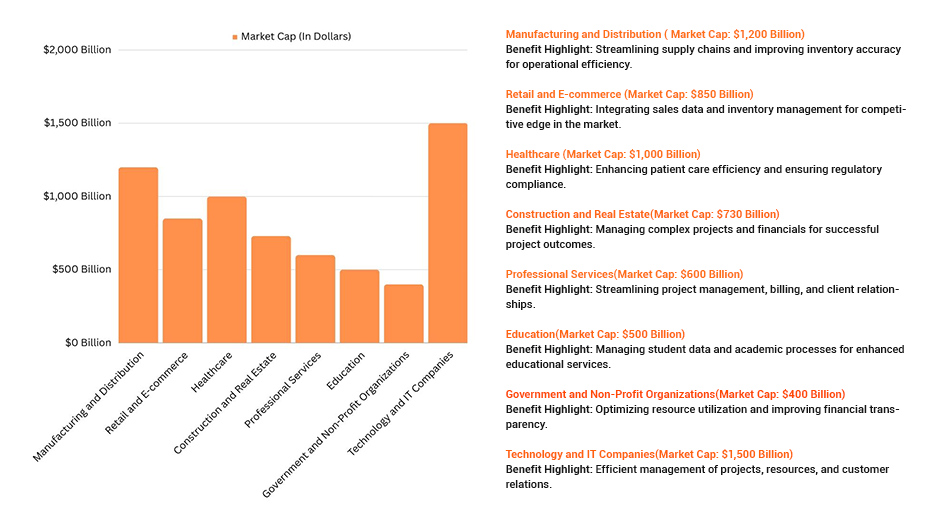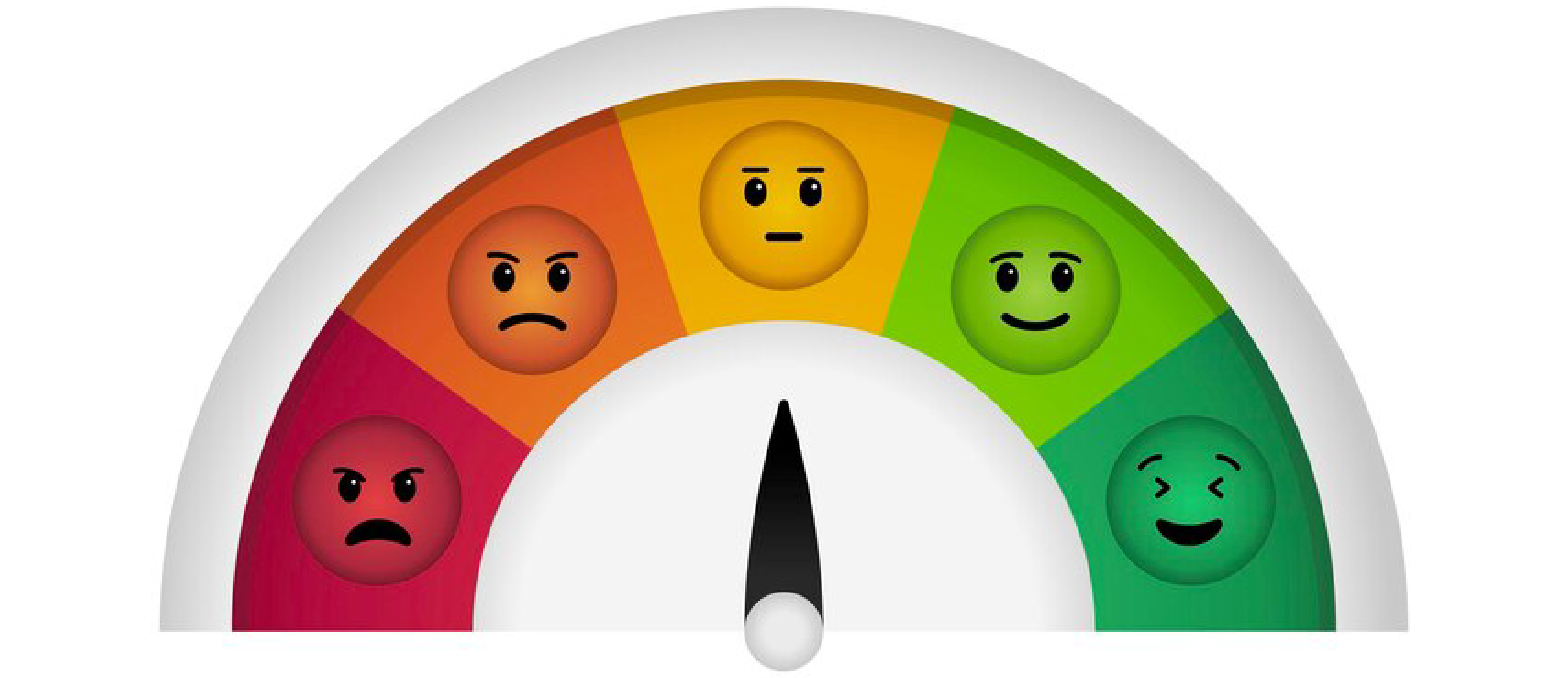Table of Contents
In 2023, the ERP software market, valued at USD 59.48 billion, is on a trajectory to reach USD 123.41 billion by 2030, growing at a CAGR of 11.0%. This expansion reflects the increasing reliance on integrated business solutions for enhanced operational efficiency. Microsoft, a significant player, dominates 31.5% of this market, propelled by its Dynamics ERP products, which align with the market’s shift towards comprehensive business management solutions
Introduction to ERP Software Development
Enterprise Resource Planning (ERP) software is one of the most important changes that can be made to business technology. ERP software is a group of programs that work together to make many business tasks easier and faster. The ERP development helps with everything from finances and HR to managing the supply chain and more. ERP systems are now necessary for businesses that want to stay competitive and flexible in a world where efficiency, data integration, and real-time insights are not just wanted but needed.
ERP systems have never been more important in shaping business strategies and results than they are now, in 2025. These systems are hard to make because they involve a lot of different tasks and require a deep understanding of both technology and the specific problems and needs of modern companies. Any business, no matter how big or small, can use ERP software to streamline operations, make better decisions, and make the whole company more efficient.
In this blog, we’ll look into all the details of making ERP software. We’ll talk about how these Digital Transformation Services are changing the way businesses work by making processes that used to be separate more efficient and unified. We’ll talk about the best things about ERP systems and show why they’re more than just an IT investment. An ERP development company is a strategic asset that can help your business grow and be successful.
We will also talk about the problems and reasons why enterprise software development implementations fail as we go through the challenges and pitfalls. Any business that wants to use ERP systems successfully needs to understand these factors. We’ll also talk about what kinds of businesses will benefit the most from these solutions and how to choose the best IT service provider for developing your ERP software.
Ready to Build? Let’s Create Your Software Solution Today!
How does ERP Software Streamline Operations for Efficiency?
Enterprise Resource Planning software integrates various functions across an organization into a single, unified system. ERP software streamlines operations, reduces inefficiencies, and fosters better business practices. Let’s explore how ERP accomplishes this transformative feat.
1. Centralized Data Management
At the heart of ERP’s efficiency is its ability to centralize data from different business units. By housing all information in one place, ERP eliminates data silos that often lead to inconsistencies and errors. This centralization ensures that every department, from finance to HR to inventory, accesses the same, up-to-date data, leading to better decision-making and smoother operational flow. Also enables the users to use secured protocols like Transport Layer Security.
2. Process Automation
ERP development can automate routine tasks across various departments. It can also take the help of artificial intelligence in software development and microservices architectures for the same. Whether it’s payroll processing in HR, order processing in sales, or inventory tracking in supply chain management, automation reduces manual effort, minimizes errors, and speeds up operations. This not only frees up employee time for more strategic tasks but also enhances overall business responsiveness.
3. Real-Time Analytics and Reporting
ERP software is equipped with powerful analytics and reporting tools that provide real-time insights into business operations. Managers can quickly generate reports on sales trends, financial performance, inventory levels, and more, without the need for time-consuming data compilation. This immediacy of information empowers businesses to make informed decisions swiftly, adapting to market changes with agility.
4. Improved Collaboration and Communication
By providing a single source of truth, ERP software development services foster improved collaboration and communication within the organization. Teams can easily share information and coordinate projects without the delays and confusion that come with disparate systems. This heightened collaboration drives efficiency, as departments work in harmony rather than in isolated bubbles.
5. Streamlined Supply Chain Management
ERP greatly enhances supply chain efficiency by providing tools for better inventory management, procurement, and demand forecasting. ERP software development services allow businesses to maintain optimal inventory levels, manage vendor relationships effectively, and anticipate customer demand more accurately, all of which contribute to a more efficient and responsive supply chain.
6. Enhanced Customer Service
With integrated Customer Relationship Management (CRM) functionalities, ERP systems provide a comprehensive view of customer interactions. Businesses can track customer histories, preferences, and feedback, leading to more personalized and efficient customer service. This not only improves customer satisfaction but also builds long-term loyalty.
7. Scalability and Flexibility
Modern ERP systems are designed for scalability and flexibility, adapting to the growth and changing needs of a business. As a company expands, the ERP system can scale to accommodate new processes, departments, and data, ensuring that the organization remains efficient regardless of size.
7 Top Benefits and Advantages of ERP Software Solutions for Your Business

From enhancing operational efficiency to improving decision-making, the impact of ERP systems is profound and far-reaching. Here are seven top benefits and advantages of implementing ERP software solutions in your business:
1. Enhanced Operational Efficiency
The ERP software development automates daily tasks and streamlines business processes. By reducing the need for manual data entry and processing, it minimizes errors and increases operational speed. This efficiency boost allows employees to focus on more strategic tasks, thus enhancing overall productivity.
2. Improved Data Accuracy and Decision-Making
With centralized data storage, ERP systems ensure that all business data is consistent and up-to-date. This accuracy is crucial for reliable reporting and analysis, enabling management to make well-informed decisions based on real-time data insights.
3. Better Financial Management
ERP systems come with robust financial management features, including budgeting, forecasting, and financial reporting. These tools help businesses manage their finances more effectively, leading to improved cost control, profitability, and regulatory compliance.
4. Streamlined Supply Chain Management
ERP solutions optimize supply chain management by providing tools for inventory management, procurement, and logistics. This leads to a more efficient supply chain with reduced costs, better inventory control, and improved supplier and customer relationships.
5. Enhanced Customer Service
By integrating CRM functionalities, ERP systems provide a 360-degree view of the customer. Businesses can track customer interactions, preferences, and history, allowing for more personalized service and improved customer satisfaction and loyalty.
6. Scalability for Growth
ERP software is scalable, meaning it can grow with your business. Whether it’s adding new functionalities, and users, or integrating with other systems, ERP can adapt to your changing business needs without compromising performance.
7. Competitive Advantage
Having an ERP system can provide a significant competitive advantage. The efficiency, insights, and agility provided by ERP systems enable businesses to respond quickly to market changes, outperform competitors, and meet customer needs more effectively.
How to Identify ERP Software Development Needs for Your Business in 2025?

As we advance into 2025, the business landscape continues to evolve, making it crucial for companies to assess their need for ERP (Enterprise Resource Planning) software meticulously. Identifying the right ERP solution is essential to address specific business challenges and to leverage emerging technologies effectively. Here’s a guide to help you identify your ERP software development needs:
1. Analyze Your Business Processes
Start by conducting a thorough analysis of your current business processes. Identify areas where inefficiencies, data silos, or operational bottlenecks exist. Understanding these pain points is crucial in determining what functionalities you need in an ERP system.
2. Define Your Business Objectives
What are your strategic goals for 2025 and beyond? Whether it’s growth, international expansion, cost reduction, or improved customer service, your objectives will influence the type of ERP system you need. Ensure that the ERP solution you choose aligns with these goals.
3. Assess Technology Trends and Future Needs
Stay informed about the latest technology trends in ERP software, like AI integration, cloud computing, mobile accessibility, and IoT connectivity. Consider not only your current needs but also future scenarios. An ERP system that is scalable and adaptable to future technologies is a wise investment.
4. Evaluate Your IT Infrastructure
Examine your existing IT infrastructure to understand how a new ERP system will integrate with it. Consider factors like hardware, software development security existing software applications, and network capabilities. The compatibility of the ERP system with your current setup is key to a smooth implementation.
5. Involve Stakeholders
Engage with various stakeholders, including management, IT staff, and end-users, to gather insights on what they expect from an ERP system. Their input is invaluable in ensuring the selected system meets the diverse needs of your organization.
6. Consider Industry-Specific Requirements
Different industries have unique challenges and requirements. Ensure that the ERP system you choose is tailored or adaptable to your industry’s specific needs. This could include compliance with industry standards, specialized functionalities, or integration capabilities.
7. Budget and ROI Analysis
Determine your budget for ERP implementation and conduct a return on investment (ROI) analysis. Consider not just the initial costs but also long-term expenses like maintenance, training, and updates. An ERP system should be a cost-effective solution that promises a good ROI.
8. Seek Expert Consultation
Finally, consider consulting with ERP experts or IT consultants. Their expertise can provide valuable insights into the latest solutions, software development best practices and pitfalls to avoid. They can also help tailor a solution that best fits your business.
Innovate, Automate, and Excel with A3logics Custom Software Development Services
What are the Disadvantages of ERP Software Solutions for Businesses?
While Enterprise Resource Planning (ERP) software offers a multitude of benefits, it’s also important to consider its potential drawbacks. Understanding these disadvantages is crucial for businesses to make informed decisions and to prepare effective strategies to mitigate these challenges. Here are some of the key disadvantages of ERP software solutions:
1. High Initial Costs
One of the most significant barriers to ERP implementation is the high initial investment. Costs include software licensing, hardware, implementation services, and training. For small and medium-sized businesses, these expenses can be particularly daunting.
2. Complexity and Time-Consuming Implementation
ERP systems are complex and their implementation can be a lengthy process, often taking several months to even years. This complexity can disrupt regular business operations and requires substantial effort from staff across the organization.
3. Resistance to Change
Introducing an ERP system often requires changing established business processes and workflows. This change can meet with resistance from employees, especially if they are not adequately involved in the selection and implementation process or trained on the new system.
4. Risk of Implementation Failure
ERP projects carry a risk of failure, often due to poor planning, inadequate resources, or a mismatch between the chosen system and business requirements. Failure can result in significant financial losses and operational disruptions.
5. Dependence on Vendor
Once implemented, businesses may become heavily reliant on the ERP software vendor for maintenance, updates, and support. This dependence can be risky, especially if the vendor fails to provide adequate service or if their business stability is uncertain.
6. Potential for Data Breach
As ERP systems centralize critical business data, they become attractive targets for cyberattacks. Ensuring robust security measures and maintaining them can be challenging and requires continuous vigilance.
7. Scalability and Flexibility Issues
While modern ERP systems are designed to be scalable, some businesses may find that their ERP solution does not easily adapt to their evolving needs. This can be particularly true with older or less advanced systems.
8. Over-Reliance on ERP
There’s a risk that employees may become over-reliant on the ERP system, potentially neglecting critical thinking and decision-making. Businesses need to strike a balance between leveraging ERP functionalities and maintaining independent strategic decision-making.
What are the ERP Implementation Failure Causes in Organizations?
Implementing an ERP (Enterprise Resource Planning) system can be a complex and challenging process, and unfortunately, not all implementations are successful. Understanding the common causes of ERP implementation failures is crucial for organizations to avoid these pitfalls and ensure a successful deployment. Here are some of the key reasons why ERP projects may fail:
1. Inadequate Planning and Analysis
Failure often begins in the planning stage. Inadequate needs analysis, unrealistic expectations, and poor project planning can lead to an ERP implementation that doesn’t align with business objectives or fails to meet critical requirements.
2. Insufficient Resources and Budget
Underestimating the resources, including time, budget, and personnel, required for a successful ERP implementation is a common mistake. Limited resources can lead to rushed deployments, inadequate training, and ultimately, an unsuccessful implementation.
3. Resistance to Change
Change resistance from employees can severely hinder ERP implementation. Lack of engagement, poor communication, and inadequate training can result in low user adoption, undermining the effectiveness of the system.
4. Lack of Top Management Support
Support and involvement from top management are crucial for ERP success. Without this, the project may lack direction, necessary resources, and the organizational influence needed to effect change.
5. Choosing the Wrong ERP System
Selecting an ERP system that doesn’t fit the specific needs of the business can lead to failure. This misalignment might be in terms of functionality, scalability, or compatibility with existing systems and processes.
6. Over-Customization
While some customization may be necessary, excessive modifications can complicate the implementation process, increase costs, and lead to future challenges in system maintenance and upgrades.
7. Poor Data Quality and Management
Inadequate attention to data quality and management during ERP implementation can result in issues like data loss, corruption, or incompatibility. Clean, well-organized data is critical for the success of an ERP system.
8. Inadequate Training and User Support
Failing to provide sufficient training and ongoing user support can lead to a lack of proficiency and confidence among employees, reducing the effectiveness and acceptance of the ERP system.
9. Underestimating the Complexity of the Project
ERP implementations are often more complex than initially anticipated. Underestimating this complexity can lead to poorly managed projects, overrun budgets, and extended timelines.
Empower Your Business with Cutting-Edge Software. Request a Free Consultation Today!
Which Types of Businesses Benefit the Most From ERP Software Solutions?
How diverse industries leverage ERP software solutions to drive efficiency and growth, presented in terms of market capitalization. These estimations highlight the significant impact and potential of ERP systems in various sectors.”

Enterprise Resource Planning (ERP) software is a versatile tool that can benefit a wide range of businesses across various industries. However, certain types of businesses may find more significant advantages in implementing ERP solutions due to their specific operational needs and industry challenges. Here are some business types that often benefit the most from ERP software solutions:
1. Manufacturing and Distribution
Manufacturers and distributors often deal with complex supply chains, inventory management, and production processes. ERP systems can streamline these operations, improve inventory accuracy, and enhance production planning, leading to more efficient operations and cost savings.
2. Retail and E-commerce
In the retail and e-commerce sectors, managing inventory, customer relationships, and sales data is critical. ERP solutions provided by any software development company in USA can integrate these elements, providing real-time data on sales trends, inventory levels, and customer preferences, which is crucial for staying competitive.
3. Healthcare
Healthcare providers face unique challenges in managing patient records, regulatory compliance, and supply chain logistics. ERP systems tailored for healthcare with the help of healthcare software development company can improve patient care efficiency, streamline administrative processes, and ensure compliance with health regulations. The can bring a digital transformation in healthcare with this.
4. Construction and Real Estate
These industries involve complex project management, resource allocation, and financial management along with financial software development. An ERP system can help in efficiently managing projects, tracking costs, and maintaining timelines, ensuring successful project completion.
5. Professional Services
For service-oriented businesses like consulting firms, law firms, or marketing agencies, ERP software can manage project timelines, billing and invoicing, and client relationships, leading to improved service delivery and operational efficiency.
6. Education
Educational institutions can benefit from ERP systems in managing student data, academic processes, and financial operations. This integration helps in better resource management and enhanced student services.
7. Government and Non-Profit Organizations
These organizations often deal with tight budgets and regulatory requirements. ERP solutions from custom software development companies in USA can help in optimizing resource utilization, managing finances transparently, and improving accountability and reporting.
8. Technology and IT Companies
For tech companies, managing projects, resources, and customer relationships is key. ERP systems can provide the tools to efficiently manage these aspects, leading to improved project delivery and customer satisfaction.
How to Select The Best IT Service Provider for Your ERP Software Development?
Choosing the right IT service provider or the custom software development services provider for your Enterprise Resource Planning (ERP) software development is a critical decision. that can significantly impact the success of your project. The right provider can ensure a smooth implementation, tailored solutions, and ongoing support. Here are key steps and considerations for selecting the best IT service provider for your ERP needs:
1. Define Your ERP Requirements
Before beginning your search, clearly define what you need from an ERP system. Consider your business processes, pain points, and what you aim to achieve with the ERP solution. This clarity will help you find a provider that can meet your specific requirements.
2. Research Potential Providers
Start by researching potential IT service providers. Look for companies with a strong track record in ERP software development, especially those with experience in your industry. Check their client testimonials, case studies, and industry reputation.
3. Evaluate Their Expertise and Experience
Assess the technical expertise and experience of the providers. It’s crucial to choose a provider with a deep understanding of ERP systems and experience in implementing solutions that align with your business size and sector.
4. Consider Their ERP Solutions and Technologies
Examine the ERP solutions and technologies the provider uses. Are they using cutting-edge technologies that can future-proof your business? Ensure their solutions are scalable, flexible, and compatible with your existing systems.
5. Assess Their Implementation Strategy and Support
Understand their approach to ERP implementation. A good provider should offer a clear implementation strategy, including timelines, project management, training, and support. Post-implementation support is vital for addressing any issues and ensuring smooth operation.
6. Check for Customization Capabilities
If your business requires specific functionalities, check the provider’s capability to customize their ERP solutions. Customization can play a crucial role in ensuring the ERP system fits your unique business processes.
7. Review Their Pricing and Contract Terms
Examine the pricing structure and contract terms. Be clear about the costs involved, including any hidden fees. Understand the terms of service, support, and maintenance agreements.
8. Look for a Client-Centric Approach
Choose a provider that values client relationships and is willing to understand and adapt to your business needs. A client-centric approach indicates a willingness to collaborate closely and respond to your specific requirements.
9. Ask for References and Conduct Due Diligence
Request references and talk to current or past clients about their experiences with the provider. Conducting due diligence can provide valuable insights into the provider’s reliability and the quality of their service.
Transform Your Software Vision into Reality – Book A 30 Minutes Free Consultation!
Conclusion
As we have explored throughout this comprehensive guide, Enterprise Resource Planning (ERP) software stands as a pivotal element in modern business strategy. From streamlining operations for enhanced efficiency to offering a suite of benefits like improved healthcare data management and decision-making, ERP solutions are indispensable for businesses seeking to thrive in today’s dynamic environment.
However, it’s also clear that the journey to successful ERP implementation is fraught with challenges. Understanding the potential disadvantages, being aware of the common causes of implementation failure, and recognizing which types of businesses stand to benefit most are essential steps in navigating the ERP landscape. Moreover, the importance of selecting the right IT service provider cannot be overstated, as this choice can significantly influence the success of your ERP project.
As we move forward into 2025 and beyond, the role of ERP systems in business operations will undoubtedly continue to evolve. With advancements in technology and changing market dynamics, the need for adaptable, scalable, and efficient ERP solutions will only grow. Businesses that are able to harness the power of these systems effectively will find themselves well-equipped to face the challenges of the future, turning potential obstacles into opportunities for growth and innovation.
In conclusion, while the path to ERP implementation and optimization may seem daunting, the rewards are substantial. By approaching this process with careful planning, thorough understanding, and strategic foresight, businesses can unlock the full potential of ERP software, propelling themselves toward operational excellence and sustained success in the competitive business world.
Fast-track your understanding with our curated FAQs
1. What is ERP Software?
ERP, or Enterprise Resource Planning, software is a type of software used by organizations to manage and integrate important parts of their businesses. It helps streamline processes by providing a central database with access to various business functions like accounting, HR, supply chain, and CRM.
2. How Long Does It Typically Take to Implement an ERP System?
The time frame for ERP implementation varies depending on the complexity of the business processes, the size of the organization, and the specific ERP solution. Typically, it can take anywhere from a few months to a couple of years.
3. Can ERP Systems Be Customized for Specific Business Needs?
Yes, most ERP systems are highly customizable. They can be tailored to meet the unique requirements of different businesses, adapting to specific industry needs, company size, and other unique operational requirements.
4. Are ERP Systems Suitable for Small Businesses?
Yes, there are ERP systems designed specifically for small businesses. These systems are often more affordable and simpler to implement, providing small businesses with the tools they need to manage their operations effectively.
5. How Much Does an ERP System Cost?
The cost of an ERP system varies widely based on factors like the size of the business, the scope of the implementation, and the specific ERP solution chosen. Costs can range from a few thousand to several million dollars.
6. What Are the Key Features to Look for in an ERP System?
Key features to look for include financial management, supply chain management, CRM, analytics and reporting, human resources management, and inventory management. The specific needs of your business will dictate the most important features.
7. Is Cloud-Based ERP Better Than On-Premise ERP?
Both cloud-based and on-premise ERP have their advantages. Cloud-based ERP offers flexibility, scalability, and lower upfront costs, while on-premise ERP provides more control over data and can be more customizable. The choice depends on the specific needs and resources of your business.






